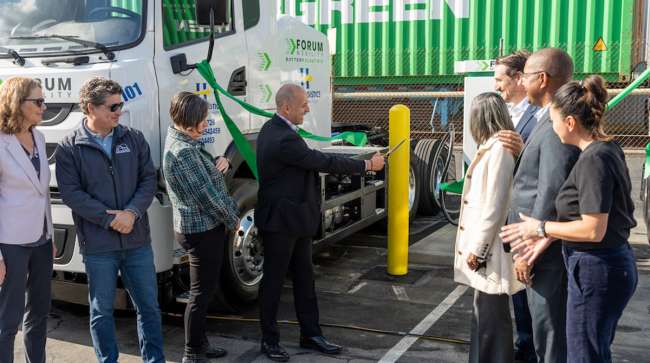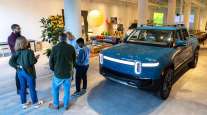Senior Reporter
Southern California Ports to Expand Electrification Efforts

[Stay on top of transportation news: Get TTNews in your inbox.]
California’s move toward its 2035 goal of requiring all drayage trucks to be zero-emission is ramping up. Port and trucking experts say to achieve that, the hard work needs to be done now and for at least the next 10 years.
One of the first steps may have been taken Dec. 7, when Forum Mobility, a startup that provides charging depots and heavy-duty electric trucks for zero-emission drayage companies, announced at the Port of Long Beach it is working with drayage company Hight Logistics. Hight received five electric trucks, fast-charging systems and the electricity those vehicles will need to begin operations at the nation’s third-busiest port.
Hight is a Southern California-based, privately held company that for 20 years has been providing drayage, warehouse and transload services, and container services at both Long Beach and the Port of Los Angeles.
“California is going to be phasing out combustion trucks from being able to operate at ports,” Matt LeDucq, CEO of San Francisco-based Forum Mobility, told Transport Topics. “We need an immense amount of charging stations and infrastructure in California, more than 150,000 medium- and heavy-duty chargers to be in the ground by 2030. What Forum Mobility is going to deliver to the market is a robust, giant network that is made exclusively for electrifying drayage trucks.”
This was a big week for Forum Mobility. We celebrated a ribbon-cutting with our first customer: a deal to provide five class 8 battery-electric trucks, fast-chargers, and all the juice needed to Hight Logistics, a drayage operator in Long Beach, CA https://t.co/iS6M59uJU9 pic.twitter.com/OMWTWZEJqy — Forum Mobility (@forum_zev) December 9, 2022
Forum Mobility is developing a network of charging depots around the Oakland and Los Angeles-Long Beach ports, and along common trucking routes to warehouse destinations,
At the ribbon-cutting to mark the occasion at Hight’s Long Beach headquarters, state officials noted that 18% of all new vehicles sold in California now are battery-electric, but more must be done to transition from diesel over the next 13 years.
“While the transition to electric is happening first with the passenger vehicle market, the migration of technology from light to medium- and heavy-duty vehicles is occurring, albeit more slowly,” said Patty Monahan of the California Energy Commission. “We stand close to a major opportunity to zero out emissions from diesel-powered vehicles and equipment. But there are challenges, including the need to rapidly build out infrastructure to refuel zero-emission vehicles.”
Monahan pointed out that during the past two budget cycles in California, Gov. Gavin Newsom and the state Legislature have allocated $10 billion for zero-emission programs, $3 billion of which is for refueling infrastructure.
This agreement between Forum Mobility and Hight is the second such plan that has been announced in Southern California in recent weeks. Last month, the Port of Long Beach unveiled a new charging station where heavy-duty trucks working at either Long Beach or Los Angeles can charge for free.
Another program also will reduce emissions. Long Beach officials said they have formed a partnership with EV Connect, a provider of charge-management services for electric vehicles, to provide the stations at the Clean Truck Program Terminal Access Center.

Cordero
“Southern California will need a network of thousands of heavy-duty charging stations, not only at the ports but all around the region, as society moves to renewable energy to fight climate change,” Port of Long Beach Executive Director Mario Cordero said.
Cordero recently told TT that one of his highest goals is to lead the port in the electrification effort, and he pointed to the port’s objective of having all zero-emission cargo handling equipment in place by 2030 and a zero-emission drayage truck fleet by 2035. About 17% of the cargo-handling equipment at the port is electric-powered, the largest such fleet in the U.S.
“This will be a challenge, but it’s one we’ll meet,” Cordero said at the annual American Association of Port Authorities convention in Orlando, Fla. “We are proud to lead, support and help accelerate the adoption of these technologies.”
Long Beach also recently announced it will receive a $30.1 million grant from the U.S. Department of Transportation to deploy the nation’s largest fleet of manually operated, zero-emission cargo handling equipment at a single marine terminal.
“The Port of Long Beach is committed to becoming a zero-emission seaport,” Long Beach Harbor Commission President Sharon Weissman said. “Step by step, we are making progress toward meeting the goals of both zero-emission terminal operations by 2030 and zero-emission trucking by 2035.”
Port officials say their move to zero emissions is working, pointing out that compared with 2005, the year before the Clean Air Action Plan was adopted, the Port of Long Beach has reduced emissions of diesel particulate matter by 88%, nitrogen oxides by 49% and sulfur oxides by 96%.
Want more news? Listen to today's daily briefing below or go here for more info:



